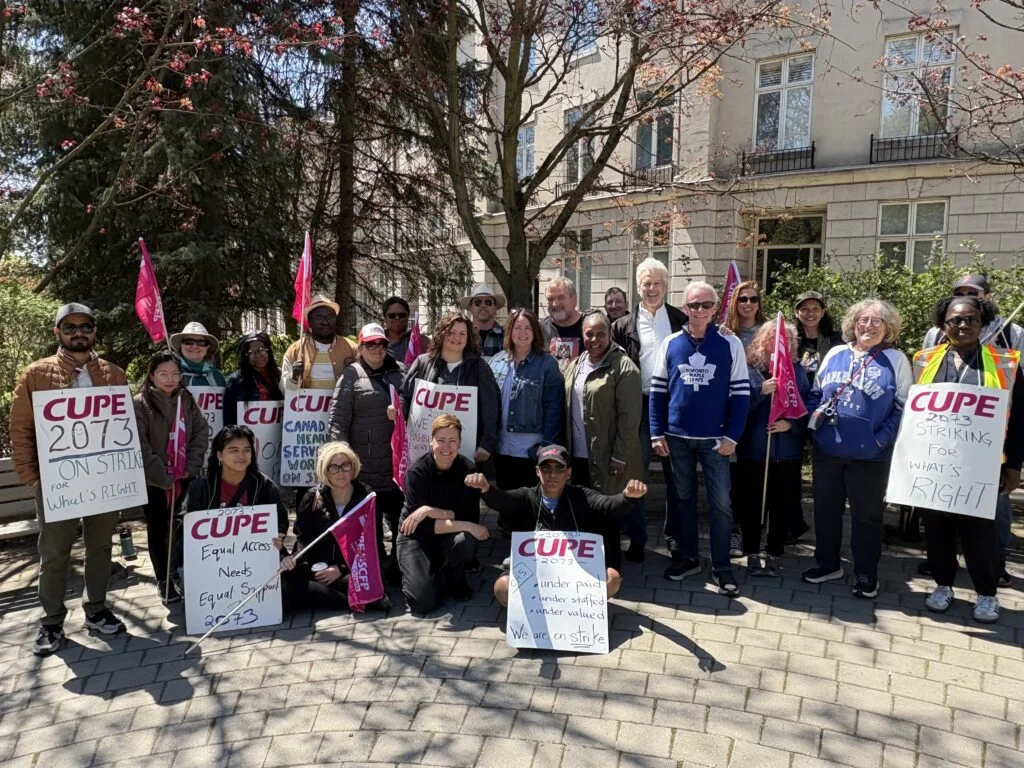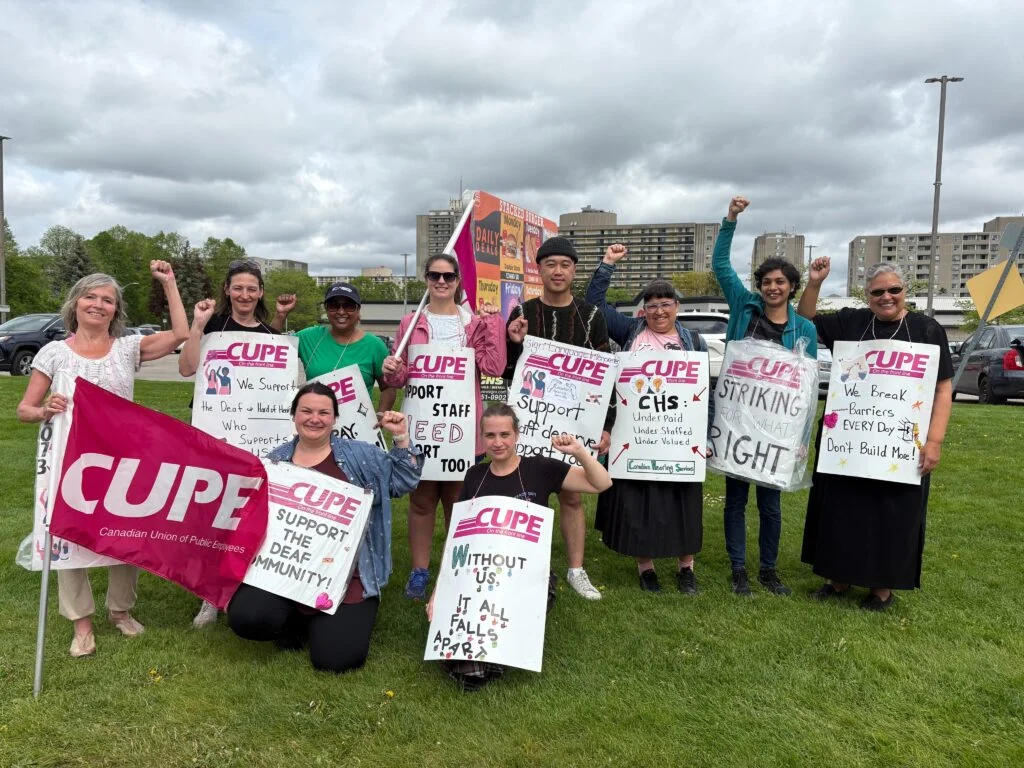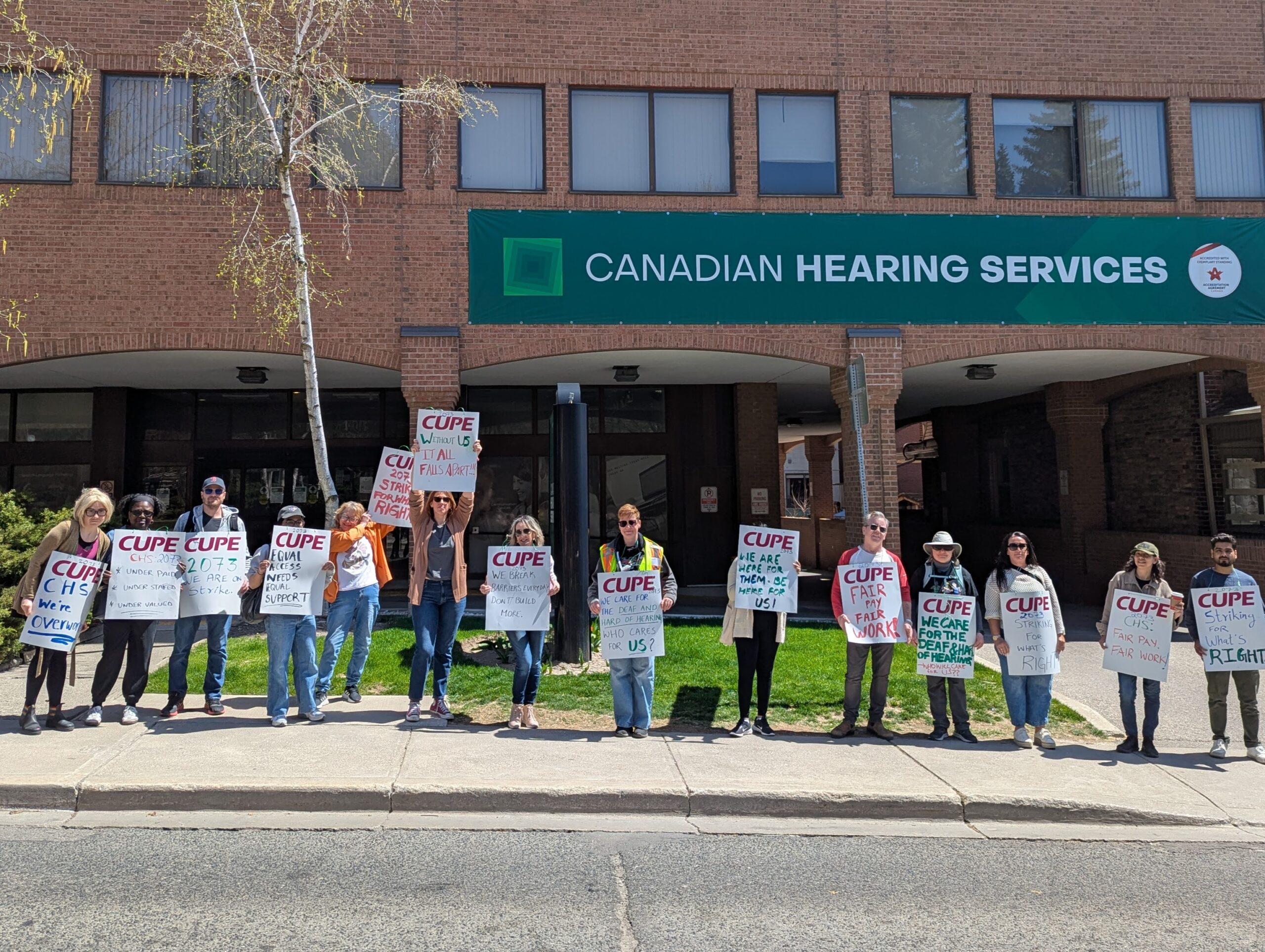The Board of Directors and CEO of Canadian Hearing Services (CHS) are refusing to negotiate with their workers, who provide essential services to the deaf and hard-of-hearing community. The latter fear that CHS bosses want to destroy the union, and that the non-profit organization no longer represents the community.
Since April 28, 200 CHS workers represented by CUPE Local 2073 have been on strike, calling for a real wage increase to make up for 16% lost to inflation. They’re also demanding more sick leave and relief from chronic understaffing. With so many positions left unfilled, each striker is doing the work of several people—a burden they say can’t continue.
Their latest collective agreement expired as of March 31st. On March 18, CHS had sent to the union what it called its “best offer” and gave workers only 24 hours to respond.
Long-time CHS worker and union steward Laura Prong told The North Star that to accommodate interpretation for deaf and hard-of-hearing workers, the bosses should have given the union at least one or two weeks. Of the 200 workers at CHS, 40% of are deaf or hard-of-hearing.
“They should know this, being CHS, that we would have to provide access to our staff members […] to review the offer. So giving us 24 hours is not feasible,” she said.
Negotiations were set to begin early in April. However, the not-for-profit's Board and its CEO Julia Dumanian refused to negotiate and immediately requested a no-board report. This report is a notice provided by the Ministry of Labour starting the 17-day countdown before workers can legally strike, or an employer can lockout its workers. In response, a strike mandate was adopted with 85% in favour with a participation rate of 73%.

“Since then, there has been no offer,” says Prong. “They have disappeared. After a certain amount of time, we were able to review the offer and make some amendments to it. They were refusing to look at our amendments. So that's where we are now […] and they have not come back to the table. We really just need a fair contract.”
CHS has repeatedly ignored workers' demands. In 2017, CUPE 2073 went on a 10-week strike after wages had been frozen since 2012 and CHS tried to cut sick leave. In 2022 and 2023, another strike was narrowly avoided when the board pushed for a one-year contract, but workers managed to secure a three-year deal.
“We have the same CEO, that's the common denominator,” says Prong. “[CHS was] founded in 1940, and we had no strikes until 2017.”
Since hiring Julia Dumanian in 2015, CHS’s Board of Governors has taken the organization in a new direction. Rather than pushing major funders like the Ontario and federal governments for more support, CHS has targeted workers’ job security. At the same time, it has cut programs and made services harder to access for the deaf, deafblind, and hard-of-hearing community.

Workers are now only offered one-year contracts rather than three-year contracts. Prong believes these contracts may get even shorter as the Board and CEO try to further weaken the union. “Most of us want a three-year contract, but CHS's goal, I believe, is to eliminate the union,” Prong said.
CHS’s website claims its board members “do not represent any particular association, community council, region, or constituency.” Yet six of the eight directors come from a business background. It’s no coincidence that over the past eight years, CHS has shifted its focus to cost-cutting, at the expense of both the community it claims to serve and the workers who deliver its services.
Since 2015, CHS workers have seen their numbers shrink from around 500 to just 200. “We had 13 regional directors that were all terminated,” says Prong. Along with them went local staff and buildings that once delivered community services. As a result, fewer workers now face heavier workloads, and service users are forced to travel farther or rely on the internet to access essential support.
“We had people who worked for a very long time with at CHS and were paid out a severance. […] When a lot of people are leaving to retirement or moving on to other positions or field, they're not replacing those staff members,” Prong says. In the years before the 2017 strike, CHS itself acknowledged a growing shortage of American Sign Language workers to replace retirees or expand its team. Meanwhile, demand for services kept rising. Yet the board and CEO’s response has been to cut staff instead of strengthening the workforce.
“We can't work this. You know, we're trying to merge a community-centered agency with what is now a very business-minded agency,” Prong said.

During the pandemic, CHS moved most of its services online. But after lockdowns ended, many in the deaf and hard-of-hearing community needed in-person support—like lip-reading, private counselling, or help for seniors unfamiliar with technology. “The community is quite upset. They expected to see CHS’s doors wide open […] and CHS did not reopen their offices to the public,” said Prong.
Longtime workers point out that CHS rules require at least half of its board to be from the deaf and hard-of-hearing community. But out of eight board members, only two are known to meet that criteria. Meanwhile, 40% of CHS’s 200 unionized workers are deaf or hard-of-hearing—meaning the workers, not the board, are those who represent the community within the organization.
When asked if CHS represents the deaf and hard-of-hearing community, Prong said “I think at a previous time in the organization's history, yes. […] But I don't think that's the case any longer.”


